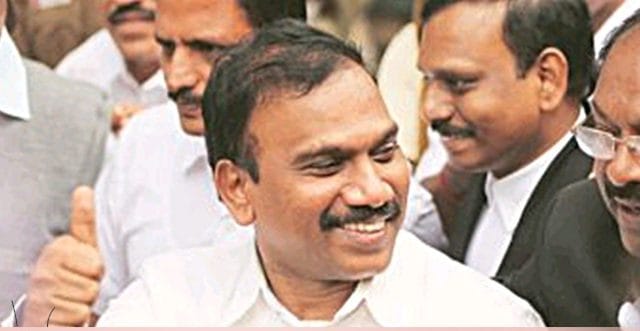Decode Politics: Why, despite the rows he triggers, A Raja remains a key leader for DMK
The MP and former Union minister's comments might be interpreted by BJP as anti-religion. But they stem from his deep roots in Dravidian politics and his ideological commitment to it -- and serve a useful purpose for his party
 Andimuthu Raja, DMK. (File Photo)
Andimuthu Raja, DMK. (File Photo)The DMK and Congress may have stitched up their alliance in Tamil Nadu for the Lok Sabha polls without much of a problem, but for their national INDIA alliance, one sore point remains – abrasive comments from DMK leaders that end up putting the party’s northern allies in a spot of bother and the BJP on the offensive.
While last September it was Udhayanidhi Stalin’s remarks about “eradicating Sanatan Dharma” — comments that drew a rebuke from the Supreme Court last week — in December DMK’s Dharmapuri MP D N V Senthilkumar dragged his party back into the BJP’s line of fire, and INDIA alliance into hot water, with his remarks on Hindi-speaking states. Now, it is the turn of former Union Minister A Raja, who on March 1 said India was not a nation in conventional terms with one language, one culture and one tradition. It was not a country, but a subcontinent, he said. Raja’s comments, at a time when the Modi government has accused the Opposition of encouraging talk of a “North-South divide”, drew a strong response from the Congress, and the RJD, another INDIA bloc party, distanced itself.
Who is A Raja?
The DMK’s Dalit face and the Nilgiris MP, Raja shot to national limelight when he was named as an accused in the 2G scam case as he was the Union Telecom Minister at the time. He was acquitted in the case in 2017.
In the DMK though, Raja was a well-known face, seen as having grown into a close confidant of DMK founder M Karunanidhi after entering the DMK in the early 1990s following the vacuum left by the departure of a leader such as Vaiko. Elected to the Lok Sabha from Perambalur in 1996, when still in his early 30s, he saw a meteoric rise. He became a Union minister in his first term as a parliamentarian and remained part of Karunanidhi’s closest circle, along with DMK veterans such as Duraimurugan.
About his tenure in government – the DMK was in alliance with the BJP at the time – Raja recently wrote in DMK mouthpiece Murasoli, “Yes, the coalition was formed with the condition (that the BJP will put on the backburner) fundamental policies like abrogating Article 370 in Kashmir, building Ram temple in place of Babri Masjid in Ayodhya, and implementing a uniform civil code. This alliance was not suitable for the Dravidian ethos ….”
Karunanidhi’s steadfast support for Raja continued during the tough times the latter faced. During the 2G controversy when the DMK was part of the UPA government, even as the BJP-led Opposition clamoured for Raja’s resignation, Karunanidhi, then the Tamil Nadu CM, strongly backed him and alleged that Raja was being targeted because he is a Dalit.
By the time Raja was acquitted in 2017, Karunanidhi’s health was sinking. The DMK MP has said that he read the order out loud to him and Karunanidhi responded with a smile.
What is Raja’s politics and what are some rows he has sparked?
Several senior DMK leaders, irrespective of their likes and dislikes, see Raja as a political leader who blends ideological commitment with tactical nous. “His prowess in both ideology and organisational strategy marks him as a rare breed in today’s party. He can deliver a fiery speech and he can mobilise maximum party resources too,” said a DMK functionary.
But this commitment to Dravidian ideology means that he often rubs political rivals the wrong way, especially Hindu nationalists. In July 2022, he faced backlash when, cautioning the Union government against the erosion of Tamil Nadu’s autonomy, he said the BJP-ruled Centre must not compel the Dravidian party to revive the demand for a “separate Tamil Nadu” by denying state autonomy.
Two months later, Raja again courted controversy when, citing Manusmriti, and critiquing the caste system he said at a Dravida Kazhagam event, “As long as you are a Hindu, you are a shudra. As long as you are a shudra, you are the son of a prostitute. As long as you are a Hindu, you are a panchaman (Dalit). As long as you are a Hindu, you will be untouchable. How many want to be a prostitute’s son? How many want to be untouchable? If only these questions were asked aloud, the roots of Sanatana dharma can be destroyed.”
As a controversy erupted, Raja clarified that he quoted lines from the Manusmriti. Stalin, meanwhile, cautioned his party colleagues and said the propaganda apparatus of the party’s rivals could twist their words and place them out of context.
In Tamil Nadu, anti-Brahminism and the self-respect movement have shaped Dravidian ethos since the 1920s. The speeches and arguments of Dravidian speakers such as Raja reflect them and as a result, their speeches have frequently triggered controversies in north India, where politics has been shaped by Hindutva and Hindu revivalism to a large extent. Raja’s comments about the scope of Tamil Nadu’s separate identity or his critique of Hindutva stem from his deep roots in Dravidian politics and not from a sense of political gamesmanship as such. In his speeches, the DMK MP often cites Karunanidhi, Periyar, and Annadurai, the icons of the DMK. While Periyar was the radical, Annadurai was a reformist, and Karunanidhi was a shrewd politician.
What is Raja’s position in the DMK now?
Raja’s political career declined after 2G and his clout in Chennai was not the same after Karunanidhi’s death in August 2018. His relationship with current DMK president M K Stalin is ambiguous, a reflection of the party leadership’s decision to maintain strategic distance from a leader who often attracts attention for his speeches and lands the party in sticky situations over his speeches.
DMK insiders, including two ministers who spoke to The Indian Express, said Stalin gives lesser importance to Raja. “Stalin respects him and yet maintains distance, perhaps wary of his speeches and the controversies that often trigger unnecessary troubles,” said one of the ministers.
Another DMK leader noted Stalin’s intricate understanding of Raja, suggesting a nuanced view shaped by the 2G case, which marked a critical phase of the CM’s political ascent. “Still, Stalin has always backed him, never denied him a position or ignored him. Stalin knows that Raja, with his comprehensive capabilities, is a potential heavyweight in the party’s future,” said the leader.



- 01
- 02
- 03
- 04
- 05




























